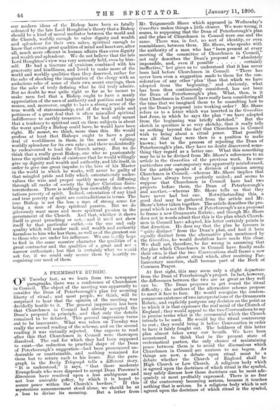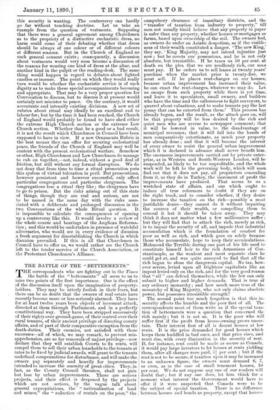A PERMISSIVE RUBRIC.
,ON Tuesday last, as we learn from two newspaper paragraphs, there was a conference of Churchmen in Council. The object of the meeting was apparently to consider the Dean of Peterborough's plan for securing liberty of ritual ; and most people, we think, will be -surprised to hear that the opinion of the meeting was decidedly hostile to it. The general impression has been that Churchmen in Council had already accepted the Dean's proposal in principle, and that only the details remained to be debated. This general impression turns out to be inaccurate. What was taken on Tuesday was really the second reading of the scheme, and on the second reading it was virtually rejected. One expects to read after this that Churchmen in Council were thereupon dissolved. The end for which they had been supposed to exist—the reduction to practical shape of the Dean of Peterborough's suggestion—had been pronounced un- desirable or unattainable, and nothing remained for them but to return each to his home. But the para- graph in the Daily Telegraph tells a different story. " It is understood," it says, " that those moderate Evangelicals who were disposed to accept Dean Perowne's Eirenicon have resolved upon a less ambiguous and not less amicable policy, by which it is hoped to secure peace within the Church's borders." If this mysterious announcement stood alone, we should be at fit loss to divine its meaning. But a letter from Mr. Teignmouth Shore which appeared in Wednesday's Guardian makes things a little clearer. We were wrong, it seems, in supposing that the Dean of Peterborough's plan and the plan of Churchmen in Council were one and the same. There was, in fact, no sort of identity, or even resemblance, between them. Mr. Shore, who speaks with the authority of a man who has " been present at every meeting of the committee of Churchmen in Council," not only describes the Dean's proposal as " absolutely impossible, and, even if possible certainly ineffective," but gives us to understand that it has never been laid before Churchmen in Council. " There has never been even a suggestion made to them for the con- sideration of any other `plan' than that which we have adopted from the beginning," and obviously, what has been thus continuously considered, has not been the Dean of Peterborough's plan. What, then, is it that Churchmen in Council have really been considering all the time that we imagined them to be consulting how to put the Dean's proposal into working order ? Mr. Shore refers us to a letter which was inserted in the Guardian last June, in which he says the plan " we have adopted from the beginning was briefly sketched." But the sketch in question is so very sketchy, that it really tells us nothing beyond the fact that Churchmen in Council wish to bring about a ritual peace. That possibly was all that they were then in a position to make known ; but in the process of rejecting the Dean of Peterborough's plan, they have no doubt discovered some- thing they regard as a better one. What this something may be is to be divined from Mr. Shore's references to an article in the Guardian of the previous week. In some particulars our contemporary was apparently misinformed, for the article speaks of a division of opinion among Churchmen in Council,—whereas Mr. Shore implies that they have always been perfectly united ; and seems to suppose that Churchmen in Council have had two projects before them, the Dean of Peterborough's and another,—whereas Mr. Shore tells us that they have never had but one. Notwithstanding this, a good deal may be gathered from the article and Mr. Shore's letter taken together. The article describes the pro- posal which is not the Dean of Peterborough's as a proposal to frame a new Ornaments Rubric ; and though Mr. Shore does not in words admit that this is the plan which Church- men in Council have adopted, his letter certainly points in that direction. He does say that the plan he favours is " quite distinct " from the Dean's plan, and had it been equally distinct from the alternative plan mentioned by the Guardian, he would doubtless have made this clear. We shall not, therefore, be far wrong in assuming that the plan which Churchmen in Council have finally made their own, is that the two Convocations shall frame a new body of rubrics about ritual which, after receiving Par- liamentary sanction, shall become part of the Book of Common Prayer.
At first sight, this may seem only a slight departure from the Dean of Peterborough's project. In fact, however, the differences between the two are as great as they well can be. The Dean proposes to get round the ritual difficulty ; the authors of the alternative scheme propose to meet it face to face. He would recognise the contem- poraneous existence of two interpretations of the Ornaments Rubric, and explicitly postpone any decision on the point as to which it is that expresses the real mind of the Church of England ; they would, appeal to the two Convocations to say in precise terms what is the ceremonial which the Church intends to be used. He would lay the ritual controversy to rest ; they would bring it before Convocation in order to have it fairly fought out. The boldness of this latter plan almost takes away our breath. We have been accustomed to think that in the present state of ecclesiastical parties, the only chance of maintaining peace between them is to avoid the discussions which Churchmen in Council are anxious to see begun. As things are now, a debate upon ritual must be a debate whether the Church of England shall be High Church or Low Church. A religious body which is agreed upon the doctrines of which ritual is the symbol, may safely discuss how those doctrines can be most ade- quately or most profitably expressed. There is no fear of the controversy becoming serious, because it touches nothing that is serious. In a religious body which is not agreed upon the doctrines of which ritual is the symbol, this security is wanting. The controversy can hardly go far without touching doctrine. Let us take ,an example from the question of vestments. Supposing that there were a general agreement among Churchmen as to the propriety of a distinctive eucharistic dress, no harm could come of their debating whether that dress should be always of one colour or of different colours at different seasons. But in the Church of England no such general consent exists ; consequently, a discussion about vestments would very soon become a discussion of the reasons for wearing one kind of dress at the altar, and another kind in the pulpit or the reading-desk. The same thing would happen in regard to debates about lighted candles or incense. The point on which they would really turn would be whether the eucharistic service is of such dignity as to make these special accompaniments becoming and appropriate. That may be a very proper question for Convocation to discuss, but to discuss it at present would certainly not minister to peace. On the contrary, it would accentuate and intensify existing divisions. A new set of rubrics about ritual may ideally be an excellent end to labour for; but by the time it had been reached, the Church of England would probably be found to have shed either the extreme High Church section or the extreme Low Church section. Whether that be a good or a bad result, it is not the result which Churchmen in Council have been supposed to have in view. If a new Ornaments Rubric is the best means they can offer for securing ecclesiastical peace, the friends of the Church of England may well be content with the present ecclesiastical warfare. Somehow or other, High Churchmen and Low Churchmen do manage to rub on together,—not, indeed, without a good deal of friction, but still without any formal disruption. We do not deny that from time to time a ritual prosecution puts this system of virtual toleration in peril. But prosecutions, however persistent and however successful, only affect particular congregations and particular clergymen. The congregations lose a ritual they like ; the clergymen have to go to prison. But the risks arising out of this state of things, though they are real and serious, are not to be named in the same day with the risks asso- ciated with a deliberate and prolonged discussion in the two Convocations of the whole Ritual question. It is impossible to calculate the consequences of opening up a controversy like this. It would involve a review of the whole course and bearings of the Anglican Reforma- tion ; and this would be undertaken in presence of watchful adversaries, who would see in every evidence of disunion a fresh argument for disestablishing the Church in which disunion prevailed. If this is all that Churchmen in Council have to offer us, we would rather see the Church left to the tender mercies of the Church Association, or the Protestant Churchmen's Alliance.







































 Previous page
Previous page